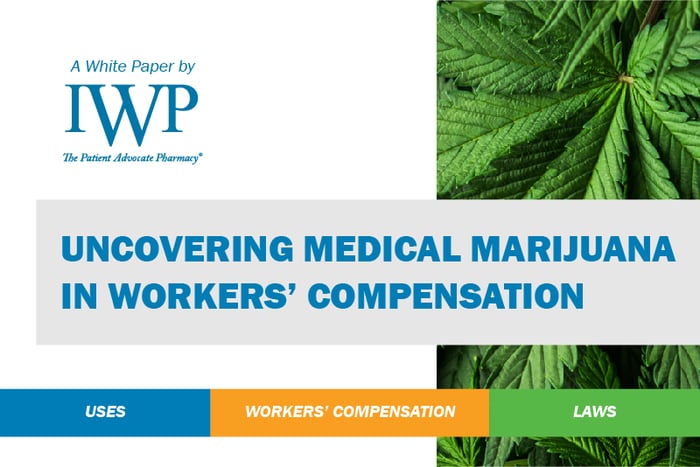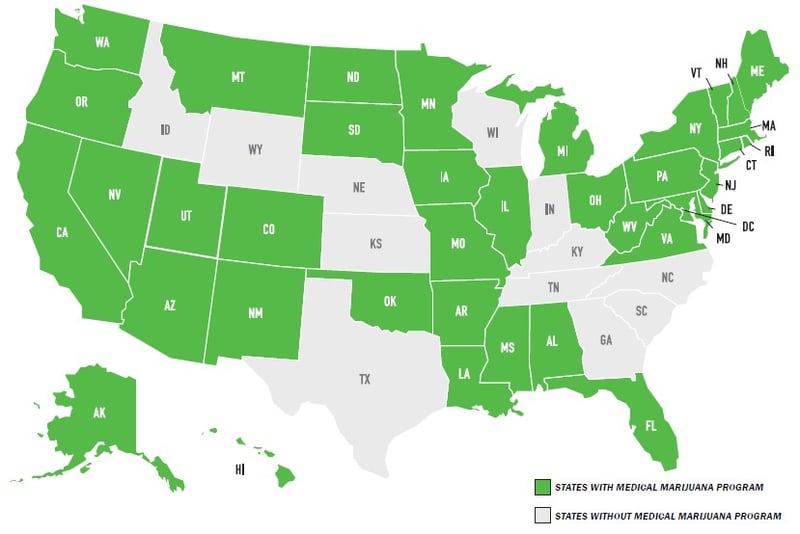
Pharmacy Choice White Paper
Medical Marijuana
Marijuana has been listed as a Schedule I controlled substance by the United States government since the creation of the Controlled Substances Act back in the 1970s. Schedule I drugs are considered to be those with the highest potential for abuse and dependency and which have no accepted medical use. However, that classification has not stopped the expanded acceptance of marijuana as a potential medical treatment across the country. Over the last few decades, states have fought back against that classification as the country’s perspective of marijuana and its usage have evolved. While marijuana remains a Schedule I controlled substance on the federal level, the majority of states have passed laws that allow for the use of medicinal marijuana.
![]() California was the first state to pass a medicinal marijuana law back in 1996, but in the years since, 36 states, along with Washington D.C., Guam, Puerto Rico, and the U.S. Virgin Islands, have joined them.i South Dakota and Alabama are the most recent states added to this list, having both passed legislation in 2021. Much like any legislative trend, every state’s approach to medical marijuana - from what diseases it can be used to treat to how a patient can purchase it - is unique.
California was the first state to pass a medicinal marijuana law back in 1996, but in the years since, 36 states, along with Washington D.C., Guam, Puerto Rico, and the U.S. Virgin Islands, have joined them.i South Dakota and Alabama are the most recent states added to this list, having both passed legislation in 2021. Much like any legislative trend, every state’s approach to medical marijuana - from what diseases it can be used to treat to how a patient can purchase it - is unique.
An Alternative Treatment Option
The most common use of medical marijuana is for pain control, specifically the treatment of chronic pain. Many argue that medical marijuana is a safer alternative given the high risk of overdose and addiction associated with opioids. Additionally, medical marijuana can be used as a replacement for NSAIDS, which some individuals are unable to use due to kidney function issues or ulcers. Many people are aware of the use of medical marijuana for glaucoma and cancer patients, often associated with treating nausea and weight loss, common side effects of chemotherapy. However, additional uses of medical marijuana include the treatment of nerve pain, multiple sclerosis, a replacement for muscle relaxants, and those suffering from Post-Traumatic Stress Disorder (PTSD).ii
Common Uses Of Medical Marijuana
-
Chronic Pain
-
Nerve Pain
-
NSAID Alternative
-
Multiple Sclerosis
-
Glaucoma
-
Muscle Relaxer
-
Effects Of Chemotherapy
-
PTSD
With the majority of states allowing for medical marijuana, coupled with its cultural acceptance, one might assume that its health benefits are clear, but in reality, we really do not know that much This is partially due to marijuana’s continued designation as a Schedule I labeled drug, which significantly eliminates any chance to conduct and fund studies that look closer into marijuana as a medical treatment on a larger scale. Therefore, what we know about medical marijuana primarily exists
from small scale studies and anecdotal evidence.iii
States With Medical Marijuana Programs

![]() Indiana– Despite multiple attempts via H1168, S 231, and S175, including some bipartisan efforts, Hoosier legislators declined to take up the matter of Medical Cannabis in 2022. All bills proposed did not advance through the committee process.
Indiana– Despite multiple attempts via H1168, S 231, and S175, including some bipartisan efforts, Hoosier legislators declined to take up the matter of Medical Cannabis in 2022. All bills proposed did not advance through the committee process.
 Kansas – Although all bills failed to pass, proposals (SB158, SB560) did find some traction among legislators. House legislators in 2021 passed a medical cannabis bill, and a bicameral conference committee this year showed slight progress. Bill language included provisions that would not require insurers to reimburse for medical cannabis in workers’ compensation. All legislative proposals ultimately were halted despite Gubernatorial support.
Kansas – Although all bills failed to pass, proposals (SB158, SB560) did find some traction among legislators. House legislators in 2021 passed a medical cannabis bill, and a bicameral conference committee this year showed slight progress. Bill language included provisions that would not require insurers to reimburse for medical cannabis in workers’ compensation. All legislative proposals ultimately were halted despite Gubernatorial support.
![]() Kentucky – The House of Representatives passed a limited version allowing for medical cannabis in the state back in March (HB136). While optimism in the Senate showed promise, upper chamber legislators declined to take on the proposal citing concerns with regulatory frameworks. In response to the legislature’s inactivity on the issue, Governor Beshear recently appointed an advisory committee for marijuana legalization. The Governor’s new committee hopes to explore increasing access to medical cannabis for vulnerable patient populations.
Kentucky – The House of Representatives passed a limited version allowing for medical cannabis in the state back in March (HB136). While optimism in the Senate showed promise, upper chamber legislators declined to take on the proposal citing concerns with regulatory frameworks. In response to the legislature’s inactivity on the issue, Governor Beshear recently appointed an advisory committee for marijuana legalization. The Governor’s new committee hopes to explore increasing access to medical cannabis for vulnerable patient populations.
 Mississippi – Lawmakers agreed (SB2095) on a statewide medical cannabis program after two years of contention. Originally Mississippi voters approved a 2020 ballot question in favor of medical marijuana. Nonetheless, the state’s supreme court found that the signature process to push the proposal onto state ballots did not meet the qualifications necessary per the state constitution. In response, legislators worked out a deal on the subject, with the final product providing medical cannabis to those experiencing debilitating conditions, including cancer. However, the bill does not allow medical cannabis reimbursement for workers’ compensation claims. The new law took effect on July 1, 2022.
Mississippi – Lawmakers agreed (SB2095) on a statewide medical cannabis program after two years of contention. Originally Mississippi voters approved a 2020 ballot question in favor of medical marijuana. Nonetheless, the state’s supreme court found that the signature process to push the proposal onto state ballots did not meet the qualifications necessary per the state constitution. In response, legislators worked out a deal on the subject, with the final product providing medical cannabis to those experiencing debilitating conditions, including cancer. However, the bill does not allow medical cannabis reimbursement for workers’ compensation claims. The new law took effect on July 1, 2022.
 North Carolina – Lawmakers in the Tar Heel state made progress this year on medical cannabis, with the State Senate agreeing to passage of SB711. Although finding some support in the House of Representatives, it is expected that a comprehensive bill is unlikely to unfold. Despite Senate efforts, leaders in the House have advocated for a smaller bill version (SB448) that would permit cannabis products only if they are FDA approved. Currently, the FDA only gives full approval to one cannabis-related medication.
North Carolina – Lawmakers in the Tar Heel state made progress this year on medical cannabis, with the State Senate agreeing to passage of SB711. Although finding some support in the House of Representatives, it is expected that a comprehensive bill is unlikely to unfold. Despite Senate efforts, leaders in the House have advocated for a smaller bill version (SB448) that would permit cannabis products only if they are FDA approved. Currently, the FDA only gives full approval to one cannabis-related medication.
![]() Nebraska – Statehouse leaders in the nation’s lone unicameral state legislature did not prioritize medical cannabis legislation in 2022. Although receiving a committee hearing in February, legislators eventually decided against advancing LD 1275. Bill language included shielding employers and insurers from reimbursing medical cannabis for workers’ compensation claims. To counter lackluster efforts in the statehouse, advocacy organizations have reportedly gathered enough initial signatures to put the issue on the ballot this November.
Nebraska – Statehouse leaders in the nation’s lone unicameral state legislature did not prioritize medical cannabis legislation in 2022. Although receiving a committee hearing in February, legislators eventually decided against advancing LD 1275. Bill language included shielding employers and insurers from reimbursing medical cannabis for workers’ compensation claims. To counter lackluster efforts in the statehouse, advocacy organizations have reportedly gathered enough initial signatures to put the issue on the ballot this November.
 South Carolina – Like its neighbor to the north, lawmakers in the State Senate passed a bill (SB150) permitting cannabis use for those with chronic pain or illness. The bill includes some stipulations, such as a ban on smokable products and home cultivation. House leadership added amendments to the legislation, which require the Senate to take a second look and approve before sending it to the Governor. Even though the legislature ran out of time to enact medical cannabis this year, lawmakers are likely to focus on the issue in 2023.
South Carolina – Like its neighbor to the north, lawmakers in the State Senate passed a bill (SB150) permitting cannabis use for those with chronic pain or illness. The bill includes some stipulations, such as a ban on smokable products and home cultivation. House leadership added amendments to the legislation, which require the Senate to take a second look and approve before sending it to the Governor. Even though the legislature ran out of time to enact medical cannabis this year, lawmakers are likely to focus on the issue in 2023.
 Tennessee – Lawmakers made incremental progress on permitting medical cannabis in 2022. Only one medical cannabis bill made it through a House Subcommittee favorably. HB2641 would allow for medical cannabis in the state for those experiencing chronic illnesses but would restrict products to be 0.9% THC or less.
Tennessee – Lawmakers made incremental progress on permitting medical cannabis in 2022. Only one medical cannabis bill made it through a House Subcommittee favorably. HB2641 would allow for medical cannabis in the state for those experiencing chronic illnesses but would restrict products to be 0.9% THC or less.
 Wisconsin – With gubernatorial support, state legislators on both sides of the aisle proposed medical cannabis bills in 2022. SB1034 garnered some support, having received a hearing in late April. The proposal would permit qualified providers to have the option to provide marijuana recommendations to their patients in liquid, oil, pill, tincture, or topical forms. Eligible patients for the state program would have included those chronic illnesses and mental health conditions such as PTSD.
Wisconsin – With gubernatorial support, state legislators on both sides of the aisle proposed medical cannabis bills in 2022. SB1034 garnered some support, having received a hearing in late April. The proposal would permit qualified providers to have the option to provide marijuana recommendations to their patients in liquid, oil, pill, tincture, or topical forms. Eligible patients for the state program would have included those chronic illnesses and mental health conditions such as PTSD.
The U.S. Food and Drug Administration (FDA) has not approved marijuana for treating any health problems and there are currently no accepted medical uses.iv The U.S. Department of Health and Human Services (HHS) evaluated marijuana and determined that the drug’s chemistry is not known or consistently reproducible, and therefore no adequate safety studies have been conducted using marijuana at this time.
In June 2019, Stanford University released a study that found the legalization of medical marijuana did not in fact reduce the rate of fatal opioid overdoses as previously reported in 2014.v However, a study in August of 2019 by University of Massachusetts Amherst and Colorado State University researchers found legalization and greater access to recreational marijuana reduced annual opioid mortality in the range of 20% to 35%.vi
Although medical marijuana has not been given heavy attention from the FDA or other similar federal authorities, a recent study affiliated with the Center for Disease Control (CDC) shows that American health experts believe marijuana can be used as a medical utility. According to the study, published in May 2021, 73% of over 2,000 doctors, nurse practitioners, oncologists, and internists surveyed agreed with the use of cannabis as medicine to treat pain.vii According to the New England Journal of Medicine, this belief has remained consistent over time as over 70% of doctors agreed with the use of cannabis for medicinal purposes back in 2013.viii
Medical Marijuana in Workers’ Compensation
With significant potential benefits, but lack of adequate medical evidence, medical marijuana exists in a relatively new space for the treatment of injuries - especially those in workers’ compensation. Supporters of medical marijuana believe the drug is critical for injured workers as a method for treating many common work-related injuries, including those with chronic pain. Recent data even suggests that in states that have legalized medical marijuana, there was a 6.7% decrease in workers’ compensation claims.ix As we find ourselves in the midst of a national opioid epidemic, the idea of a less addictive medication to treat pain long-term is increasingly appealing.
Due to great uncertainty surrounding medical marijuana and workers’ compensation, it comes as no surprise that legal challenges have sprung up across the country in recent years. While the specifics of each case vary, much like medical marijuana laws vary by state, a common theme for such legal challenges center around one question: Is medical marijuana an acceptable and covered treatment under workers’ comp?
While the number of states that have approved medical marijuana legalization and even recreational legalization is on the rise, there continues to be a trend of confusion regarding each state’s workers’ compensation system and its role with medicinal marijuana. While a state such as Colorado may have legalized marijuana both recreationally and for medicinal purposes, current statutes in the state do not require insurers to reimburse or cover medicinal marijuana under workers’ compensation.
Some states, like Florida, South Dakota, and North Dakota, tackled the issue head on in their laws, specifically excluding medical marijuana from workers’ compensation coverage. In contrast, Connecticut, Maine, Massachusetts, Minnesota, New Hampshire, New Jersey, New Mexico, and New York all relied on court rulings to clarify medical marijuana’s position in workers’ compensation. In 2021, Maryland legislators attempted to pass a bill that would have covered medical marijuana under workers’ compensation, but like previous bills in other states, it never made it out of the lower chamber. Most legislative attempts to address this question have fallen flat, leaving the courts to be the primary source to seek clarification.
Making a Case for Medical Marijuana
One of the first cases to tackle the issue of medical marijuana in workers’ compensation came from New Mexico. In Vialpandov. Ben’s Automotive Services and Redwood Fire & Casualty, the New Mexico Appellate Court found that medical marijuana was reasonable and necessary medical care for the injured worker’s chronic pain as defined by the state’s workers’ compensation statutes.x
Similar rulings were issued by the Connecticut Workers’ Compensation Review Boardxi in 2017 and the New Jersey Division of Workers’ Compensation.xii In those decisions, both Boards similarly found that medical marijuana was reasonable and necessary for the treatment of the injured workers’ injuries.
 Assuming a court or law allows medical marijuana in workers’ compensation, additional questions are raised, most notably whether an insurer should be required to provide reimbursement for a drug considered illegal on the federal level.
Assuming a court or law allows medical marijuana in workers’ compensation, additional questions are raised, most notably whether an insurer should be required to provide reimbursement for a drug considered illegal on the federal level.
With medical marijuana remaining a Schedule I drug, it lacks a National Drug Code (NDC). NDCs are used for billing and reimbursement of prescription medications and without one, it would be nearly impossible to establish a standardized reimbursement rate for medical marijuana.
Federal Law Violations?
Insurers across the country have argued that a state cannot compel them to cover medical marijuana because doing so would violate federal law that prohibits the use and possession of the drug. The counterargument to this assertion, made by claimant’s counsel in numerous cases, is that the U.S. Department of Justice (DOJ) has a federal policy of noninterference with state medical marijuana programs.xiii The DOJ has found that it is an inefficient use of limited federal funding to prosecute those that use medical marijuana in compliance with state laws - meaning, an insurer required to cover medical marijuana used to treat a work injury would not be prosecuted for violating federal law. Regardless of the DOJ’s stance, some state courts do not want to require medical marijuana to be covered by workers’ compensation insurers until federal law is clearer.
Following a number of years of controversy on the subject, a recent Minnesota Supreme Court ruling clarified the federal stance on medical cannabis compensability in workers’ compensation. Despite previous decisions in favor of medical cannabis coverage, the Minnesota Supreme Court reversed precedent believing that pushing insurers to reimburse for medical cannabis could implicate insurers in violating the Controlled Substance Act (CSA). Injured workers in support of medical cannabis coverage contested this stance, appealing to the U.S. Supreme Court (SCOTUS) to decide the case. In response, SCOTUS asked the Department of Justice (DOJ) to weigh in on the matter, to which the agency asked the court to ‘pass’ on the topic. SCOTUS Justices agreed with DOJ officials not to take up the case. As such, medical cannabis coverage in workers’ compensation remains a state-to-state issue.
With Limited Legislation, States are Addressing the Reimbursement Question through their Legal System.
![]() In 2017, the Maine Workers’ Compensation Appellate Division found that a self-insured employer is not exempt from the Maine Medical Use of Marijuana Act (MMUMA) requirement that reimbursement be provided for costs associated with medical marijuana.xiv
In 2017, the Maine Workers’ Compensation Appellate Division found that a self-insured employer is not exempt from the Maine Medical Use of Marijuana Act (MMUMA) requirement that reimbursement be provided for costs associated with medical marijuana.xiv
However, less than a year later, the Maine Supreme Court weighed in on the topic and, in contrast to the majority of decisions being issued on the topic across the country, concluded that the state could not compel a carrier to violate federal law by mandating coverage for marijuana.xv
![]() Although the state has fully legalized Marijuana, the appeals court ruled against workers’ compensation claims to cover medical marijuana in 2021. The court cited a ruling in 2020 to justify their position that treads carefully on the federal government’s current stance on marijuana.
Although the state has fully legalized Marijuana, the appeals court ruled against workers’ compensation claims to cover medical marijuana in 2021. The court cited a ruling in 2020 to justify their position that treads carefully on the federal government’s current stance on marijuana.
![]() In March 2019, the New Hampshire Supreme Court found that a workers’ compensation insurance carrier was wrong to deny reimbursement for the cost of medical marijuana when the employee was using it to treat pain associated with his work-related injury.xvi This was reaffirmed in 2021 when the court stated that it was “not persuaded” by the state’s arguments that an insurance carrier, under the federal Controlled Substances Act, could be prosecuted for aiding and abetting a marijuana possession crime if it has to reimburse.
In March 2019, the New Hampshire Supreme Court found that a workers’ compensation insurance carrier was wrong to deny reimbursement for the cost of medical marijuana when the employee was using it to treat pain associated with his work-related injury.xvi This was reaffirmed in 2021 when the court stated that it was “not persuaded” by the state’s arguments that an insurance carrier, under the federal Controlled Substances Act, could be prosecuted for aiding and abetting a marijuana possession crime if it has to reimburse.
![]() In March of 2021, in the case of Quigley v. Village of East Aurora, the court ruled that the provider was required to reimburse the injured worker for medicinal marijuana purchases. In its decision, the court also noted that current laws passed by state legislature “did not intend to exempt workers’ compensation carriers from the obligation to reimburse injured claimants for their medical marijuana expenses.”xvi
In March of 2021, in the case of Quigley v. Village of East Aurora, the court ruled that the provider was required to reimburse the injured worker for medicinal marijuana purchases. In its decision, the court also noted that current laws passed by state legislature “did not intend to exempt workers’ compensation carriers from the obligation to reimburse injured claimants for their medical marijuana expenses.”xvi
While the courts in New Hampshire & New York left the more complex question of whether the federal law making marijuana illegal was enough for a carrier to deny reimbursement, they did clearly find that the state does not preclude an insurer from covering medical marijuana. In fact, the court stated that, had the legislature intended for carriers to be exempt from such a requirement, then they would have clearly indicated so in their statute, as was done in Florida.
Finally, in determining how medical marijuana works within workers’ compensation, laws must first determine: What is the standard for when medical marijuana is allowed?
Workers’ compensation medical treatments, including prescriptions, are often closely controlled by workers’ compensation divisions, regulations, and even insurers. With little scientific conclusiveness on the use and effect of medical marijuana, as well as the current federal stance on marijuana, states have struggled with how, when, and where to allow its use.
Potential Accepted Roles Uncertain
For example, in the Petrini v. Marcus Dairy, Inc. case from Connecticut, the injured employee tried dozens of different medications and a spinal cord stimulator to address his injury before his doctor prescribed medical marijuana. The most common acceptance of medical marijuana is for chronic pain treatment, and it seems to be widely accepted that treatment should not be the first line of defense, but rather an alternative when other traditional options fail. However, without clear guidance in laws and regulations, the question of when and where medical marijuana will be accepted in workers’ compensation remains uncertain at best.
Medical marijuana is more than just a hot topic in workers’ compensation. With the ever-changing landscape, ongoing opioid epidemic, and expanded social acceptance of marijuana across the country, the potential role and growth of medical marijuana in the workers’ compensation industry seems expediential, but any such growth comes with significant questions, concerns, and challenges.
It seems likely that medical marijuana will find its place in workers’ compensation in the immediate future given society’s increased interest in marijuana’s potential medicinal benefits. With a history of states becoming unable to reconcile medical marijuana under workers’ compensation through legislation, there will be a long, uncertain road ahead where much of its success, or failure, will be determined by legal precedent, state by state.
Sources
i. National Conference of State Legislature. (2021, May 17). State Medical Marijuana Laws. Retrieved from https://www.ncsl.org/research/health/state-medical-marijuana-laws.aspx
ii. Grinspoon, P., MD. (2019, June 05). Medical marijuana. Retrieved from https://www.health.harvard.edu/blog/medical-marijuana-2018011513085
iii. Zhang, S. (2017, April 10). Patients Are Ditching Opioid Pills for Weed. Retrieved from https://www.theatlantic.com/health/archive/2017/02/marijuana- cannabinoids-opioids/515358/
iv. Marijuana and Cannabinoids. (2018, October 25). Retrieved from https://nccih.nih.gov/health/marijuana
v. Humphreys, K. (2019, June 10). Medical marijuana does not reduce opioid deaths. Retrieved from http://med.stanford.edu/news/all-news/2019/06/ medical-marijuana-does-not-reduce-opioid-deaths.html
vi. Chan N. & Burkhardt J. (2019, August 19) Marijuana Legalization Reduces Opioid Deaths. Retrieved from https://www.sciencedaily.com/releases/2019/08/190807092350.htm
vii. Esola L. (2021, May 24). Majority of Doctors Support Medical Pot for Pain: study. Retrieved from https://www.businessinsurance.com/article/20210524/NEWS08/912342032/Majority-of-doctors-support-medical-pot-for-pain-Study-
viii. Castillo M. (2013, May 31). 76% of Doctors Approve of Medical Marijuana Use. Retrieved from https://www.cbsnews.com/news/survey-76-percent-of-doctors-approve-of-medical-marijuana-use/
ix. Ghimire K. & Maclean J. (2020, February 4). Medical Marijuana and Workers’ Comp Claims. Retrieved from https://onlinelibrary.wiley.com/doi/abs/10.1002/hec.3992
x Vialpando v. Ben’s Automotive Services, 331 P.3d 975 (N.M. App. Ct. 2014), cert. denied, 331 P.3d 924 (N.M. 2015)
xi Petrini v. Marcus Dairy, Inc., State of Connecticut (Workers’ Compensation Commission Review Board October 5, 2016)
xii Watson v. 84 Lumber (New Jersey Department of December 12, 2016)
xiii Ogden, D. (2009). Memorandum for Selected United States Attorneys (USA, U.S. Department of Justice, Office of the Deputy Attorney General)
xiv Gary A. Noll v. Lepage Bakeries Inc., (Maine Workers’ Compensation Board No. 16-25 August 23, 2016)
xv Bourgoin v. Twin Rivers Paper Co., (Maine Supreme Judicial Court 187 A. September 13, 2017)
xvi Appeal of Andrew Panaggio (N.H. Comp. Appeals Bd., 2019 N.H. LEXIS 35 March 7, 2019)
xvii Quigley v. Village of E. Aurora (NY App. Ct. 2021).

